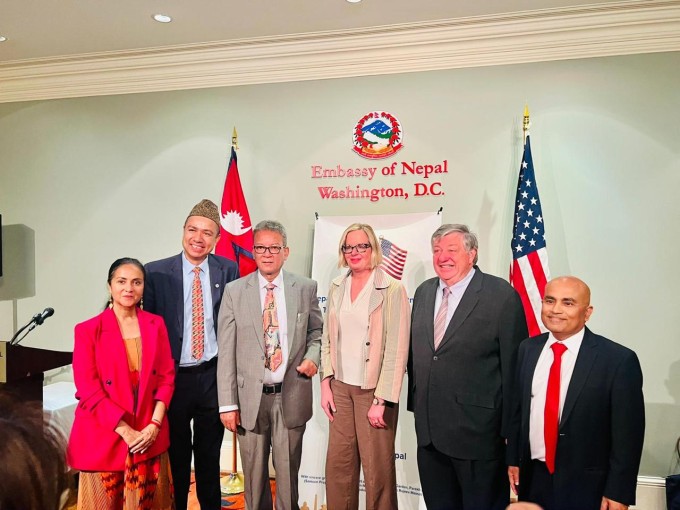Irma Chavez is a married mother of four who leads a business networking initiative in this small Arkansas city she calls home. It’s a long way from her life as a live-in housekeeper in California years ago, and further still from a childhood working in El Salvador’s coffee fields.
What has indelibly marked the path of the 44-year-old marketing specialist is a government program that allows people from countries ravaged by disaster and war to live and work legally in the United States. While the Trump administration tried to cancel the program for many immigrants, President Joe Biden is backing legislation that would give Chavez and hundreds of thousands of people like her a shot at becoming American citizens.
It’s a monumental shift from just six months ago, when a court gave the Trump administration the right to halt Temporary Protected Status, or TPS, for four countries, stoking fear among many of the program’s 411,000 recipients that they could be sent back to their homelands. Many, like Chavez, haven’t lived there in decades.
Now, these immigrants are pinning their hopes on the Senate after the House passed a sweeping bill to let them call the United States their permanent home. The legislation, which faces uncertain prospects, would offer an eight-year pathway to citizenship to an estimated 11 million people in the U.S. illegally and put immigrants brought to the country as children and TPS recipients on an even faster track to becoming Americans.
For Chavez, who lives in Springdale, Arkansas, and has been renewing her temporary status for two decades, the legislation could put an end to fears that she might be deported without her children. It also would allow her to travel more easily to see her mother and sister in their humble Salvadoran hometown lined with dusty streets.
“We really hope everything is going to change in our favor now,” Chavez said. “We are good people. We work. We do our taxes. We pay our taxes.”
The U.S. Homeland Security secretary can designate a country for TPS as it recovers from natural disasters, war or other circumstances preventing people from returning home safely. Last fall, there were 10 countries in the program. The Biden administration, which has eased some of Trump’s hardline immigration policies and is facing an uptick in migration, has recently added two more — Myanmar and Venezuela.
While temporary, the program can be renewed by U.S. officials and has been repeatedly. If supporters and critics agree on anything, it’s that a temporary program should not last decades.
More than half of those with the status are from El Salvador, which was designated for the program after a 2001 earthquake. Many Salvadorans who initially qualified for TPS had fled their country after a civil war and have set down roots in communities from California to Arkansas. Most have no plan of returning to a country that still sees thousands leave each year in search of economic stability and safety from gangs.
Giving these immigrants the ability to stay could drive many of them to buy homes and invest in businesses in U.S. communities still reeling from the coronavirus pandemic, said Manuel Orozco, director of the Center for Migration and Economic Stabilization at the development organization Creative Associates International.
“It’s almost like the logical thing to do because they are de facto Americans,” Orozco said. “It definitely will create better conditions for them not only to integrate but also strengthen their economic roots, improving the economy.”
___
On the outskirts of El Salvador’s second-largest city, Santa Ana, Iris Franco runs a bakery at home and delivers the bread on a bike. It’s how she makes ends meet for herself and her four children, the oldest of whom is studying to be a doctor — the first in her family to attend college.
Already that’s a change from how she grew up. Neither she nor her older sister, Chavez, finished high school. They both worked as kids while their mother, who lived in a house made from adobe, sold tamales to scrape by.
In 1994, the family reluctantly agreed Chavez would travel north with smugglers to stay with relatives in Los Angeles and work for three years. She would save up money and come back.
It didn’t happen quite as they planned. Chavez got married and had children. But the money she vowed to send always arrived — first, in small bits, then more once she started getting better-paying restaurant and retail jobs under TPS.
Franco, 41, said the family lives humbly but is in a better place thanks to her sister’s help. Her mother’s home is modest, but more stable, and when Franco’s home was destroyed in a flood, Chavez’s contributions helped her rebuild.
Chavez sends money to help cover their mother’s diabetes medication and food, which is out of reach for their mother, who earns $6 a day in the family bread business.
“It changed our life, because we knew that we had my sister in that place, and so in whatever she could, she has helped us,” Franco said. “She has always paid attention to us.”
The Central American country of 6.5 million people has long relied on migrants sending money home to help power its economy, totaling nearly $6 billion last year. Since people with the temporary status often hold higher-paying jobs than those without legal papers, they’re sometimes able to contribute more to their families, said Jesse Acevedo, a University of Denver political science professor who researches international migration.
Not that migration hasn’t come at a price. Franco remembers her sister crying when their mother was ill and she couldn’t be there and on the many Mother’s Days she missed.
But now the technology is better, so the sisters can swap text messages daily and speak several times a week. They finally saw each other four years ago when Chavez filed paperwork with the U.S. government to travel to El Salvador. She surprised her mother, Elsa Victorina Franco, at the airport, met her nephews and nieces and agreed to send what she could to help the oldest train to become a doctor.
Chavez was afraid that she wouldn’t be allowed back in the United States when she flew back after her trip. Such cases are up to U.S. border officials; but they let her in.
“When we went to drop her off, she told me, ‘Mom, pray that they don’t detain me,’” her mother said. “God answered us.”
___
In Arkansas, Chavez gets her two youngest sons ready each morning for school, then heads home to hop on Zoom calls for work. She leads a business networking initiative she hopes will lead to Springdale’s first Latino chamber of commerce.
Her husband, a Brazilian-born chef at a well-known restaurant, helps the younger kids with homework, but she’s the main cook at home, giving him a break from the kitchen. Her oldest son will get married later this year, and the next in line works as a delivery driver. Both are from a previous marriage.
Chavez’s bustling life in a brick-sided house looks little like her early start in the United States. She arrived as a teenager and stayed with relatives in Los Angeles until she got a job as a live-in housekeeper, picking up English from the children she cared for. Once she married and had kids of her own, she worked the night shift at a gas station.
She had no driver’s license, bank account or Social Security number. That meant limited health benefits and fears she could be deported.
Once Chavez got temporary status, things changed. She got jobs in stores and restaurants, moved to Oklahoma and later Arkansas, and eventually landed work in a chiropractor’s office where she brought in Latino clients and helped with Spanish translation.
After her trip to El Salvador, Chavez decided she wanted to do more to give back. She and her sister started a nonprofit to help children in their Salvadoran neighborhood, giving them backpacks and school supplies and a gift and party at Christmas.
For Chavez, who has renewed her status every 18 months, it was eye-opening when the Trump administration announced it would cancel the program for various countries, including El Salvador.
“I learned a lot from that, that we’re not safe in this country unless we are citizens,” she said.
Salvadorans joined TPS recipients from Haiti, Nicaragua and Sudan in litigation aimed at protecting the program and lobbied lawmakers for a more permanent fix. In December, the government granted an extension of TPS as the issue winds through the courts.
The White House transition has brought relief to Chavez and many others with the status, but it still doesn’t guarantee her life in the United States. She will still need to repeatedly renew her federal paperwork and with it, her driver’s license. She can’t travel freely to El Salvador or apply to bring her aging mother, who is too poor to qualify for a travel visa, to be with her.
“She doesn’t know her grandchildren,” she said.
TPS also doesn’t solve her own immigration problems. Chavez’s U.S. citizen husband has sponsored her for a green card, but she would need to get an old immigration court order cleared to be able to apply. She fears doing so could put her at risk for deportation.
The bill in Congress could change that, giving her the assurance she’s long dreamed of that she will never be separated from her children.
“If there were an amnesty or residency for all those on Temporary Protected Status, I’d automatically be in,” she said. “I’d always be protected from deportation. It would have a big impact.”







